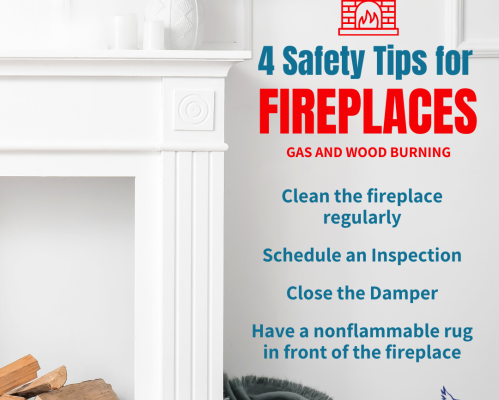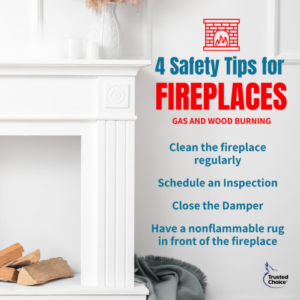Please donate to help those in need this holiday season.
Blog
Fireplace Safety Tips
Why might have my insurance rates gone up?
In case you wondered why auto and home insurance rates increase when your car is older and you haven’t had an accident…

- We all know that miles driven on US roads dropped dramatically last year. In 2021, the rebound has been equally dramatic – returning to about 94% of the pre-COVID peak and continuing to increase.
- The percentage of crashes with airbag deployment or non-drivable vehicles is the highest it’s been in 5 years suggesting more higher speed crashes are occurring.
- Average vehicle repair costs are up over 30% in the past five years, with a good bit of that increase coming in 2021.
- Parts availability is driving repair cycle time up, combined with the cost of parts, adding significantly to overall claim cost.
- On the property side, while lumber prices have leveled, overall inputs to residential construction were up 19% since pre-pandemic.
- In the mix as well is the steep increase of liability costs on litigated cases – which is a trend that predates the pandemic but was accelerated by it.
A Guardian’s Guide: How To Help Teen Drivers Be Safe
Read time: 3 minutes
Hello, responsible guardians!
First of all, good for you. Good job researching how you can keep your teen driver safe. We hope we can help both you and your teen feel more confident about hitting the road with these tips.
- Parent and teen driving rules
- Parent-Teen Driving Contract template
- Safe driving vehicle features
- Apps to track your teen driver
- Safe teen driving discounts
- Adding a teen driver to your auto policy
Before you hand your teen the keys, establish some ground rules together to keep them safe. Keep in mind, every teen matures differently and will likely need different rules to help them be a safe driver.
Some rules to consider establishing with your teen driver can include:
- No passengers, especially other teens
- Minimize distractions
- Make a list with your teen of specific things that may distract them (eating, music, phone calls, texting and social media)
- Never drive under the influence of alcohol or any drug. Also, never get in the car with anybody under the influence
- Follow the speed limit
- Require everybody in the car to wear seatbelts
- Be home by a set curfew
- Follow traffic laws and signals
Consider utilizing videos and statistics from reputable safety organizations, like the National Highway Traffic Safety Administration, to help explain why these rules are important.
Read more: You Just Got into a Car Accident. Now What?
Create a Parent-Teen Driving Contract using our template
To help your ground rules stick, you can create a Parent-Teen Driving Contract. Your teen will sign the contract to show they understand and agree to the terms of their driving privilege. Driving is a privilege and a responsibility, not a fun activity. To help you get started, we created this Parent-Teen Driving Contract template.
Equip your teen’s vehicle with safe driving features
Beyond setting rules for your teen’s driving, evaluate the car they will be using. Is it safe? Consider finding a vehicle with some of the newer safety features, if possible.
Some car safety features that may help your teen include:
- Automatic emergency braking (AEB)
- Rear-view camera/360-degree camera
- Blind spot detection
- Lane departure warning (LDW)
- Lane keeping system (LKS)
- Forward collision warning
Read more: How to Avoid Distracted Driving
Use an app to track your teen’s driving
For ultimate accountability, consider using an app that tracks your teen’s speed, phone usage and location. There are several options in the app stores; some of them are even free. For most apps, you will need to download the app on both your phone and your teen’s phone.
Some popular apps include:
- Mama Bear
- Automatic
- TrueMotion Family Safe Driving
- Life360
- AT&T Drive Mode
Some phones and apps out there may also have drive detection, which can track when certain apps are used while driving. So, research your teen’s phone capabilities to see what’s available.
We give discounts for safe teen driving because it’s worth rewarding!
When you and your teen feel confident about their safe driving, we want to celebrate with you. That’s why we offer the following safe teen driving discounts.
You could work this into your Parent-Teen Driving Contract as an incentive. If they achieve our discounts, you can reward them with a special treat of some sort.
- Teen Driver Monitoring Discount: If your teen driver has a GPS unit attached to the vehicle they use most or an eligible app on their phone, they may qualify for this discount. You will need to provide proof of purchase or other documentation for the GPS unit or the eligible phone app. Talk to your agent for more information.
- Good Student Discount: To qualify for this discount, your teen must be a full-time high school, college, university or vocational technical school student (under the age of 25). They will also need to show us their report card or scholastic record to prove they meet one of these requirements:
-
- Rank among the upper 20% of their class
- Have a “B” average
- Have an average of three points on a four point scale
- Included in the dean’s list or honor roll
-
How do I add my teenager to my auto policy?
Contact your agent and let them know you need to add your teen as a rated driver. They will need to know what vehicle they will be operating and their daily commute.
Summary: Helping your teen navigate the responsibility and privilege of driving is daunting. Set boundaries, make a contract, give them lots of practice, be a good example and keep the conversation about safe driving going!
Copyright Auto-Owners Insurance Company © 2021. All Rights Reserved.
8 Steps to be Confident in Your Commercial Insurance
Who can be a life insurance beneficiary?
Every life insurance policy requires you to name a life insurance beneficiary. A beneficiary definition is simply who gets the payout on the life insurance policy in the event you pass away.
Your beneficiary can be:
- A person
- Several people
- An estate
- A trust
- A charity
Life Insurance Beneficiary Tips
Here are some basic things to know about naming a life insurance beneficiary along with a few helpful tips:
- Know that you can name more than one beneficiary. You can name one beneficiary or two or more beneficiaries. You’ll typically be asked which percentage of the payout goes to each person— for instance, you could designate 70% to a spouse and 30% to an adult child.
- Make sure to name a secondary beneficiary. Think of a secondary, or contingent, beneficiary as a backup. He or she receives the life insurance payout in the event the primary beneficiary is no longer alive when the payout is being made.
- Be specific with names. It’s best to list the name and Social Security number of each beneficiary rather than something generic like “my children.” This will prevent any confusion and speed up the payout process.
- Keep your beneficiaries in the loop. Tell your life insurance beneficiaries about your plans and give them copies of the policy.
- Review your life insurance policy and its beneficiaries once a year. In addition to an annual policy review, you’ll want to revisit your life insurance policy after any major life event like a marriage, birth, divorce, or death.
Special Beneficiary Considerations
- Think through how to provide for a minor. Providing for kids is a big reason why many people buy life insurance. Most people name a surviving parent or partner as the beneficiary, with the understanding that the payout will help cover kid-related costs. But that’s not a possibility if you’re widowed or if you and your spouse or partner pass away at the same time. In situations like this, it’s best to name a highly trustworthy adult custodian as the beneficiary or to work with an attorney to set up a trust to manage and distribute the funds. Whatever you do, don’t name the child as the beneficiary—the law prohibits anyone from receiving a life insurance payout if they aren’t the age of majority (which could be 18 or 21 depending on your state).
- Consult with an attorney if you have a disabled or special needs child. You’ll want to set up life insurance for a disabled or special needs child in a way that doesn’t impact his or her eligibility for certain government programs like Medicaid. The best way to do that is to work with an attorney to set up a trust to benefit the child.
- Avoid naming your estate as a beneficiary. Naming your estate as a beneficiary is a bad idea because it leads to a long (and potentially costly) legal process known as probate. For this reason, it’s a better idea to name a person, people or organization as the life insurance beneficiary.
- Know that there’s several ways to benefit a charity. Leaving money to a nonprofit organization is one reason people take out a life insurance policy. There are four ways to benefit a charity: by naming it as a beneficiary; by making it both the owner and the beneficiary of a life insurance policy; by adding a charitable-giving rider to a life insurance policy; and by working with a community foundation.
- Get help with other special situations. There can be tax consequences and other issues if the policyholder and insured aren’t the same person. Ditto if you live in a community property state and don’t name your spouse as a beneficiary. Avoid any tangles by turning to your insurance agent or attorney for advice.
Get help with naming beneficiaries and with all things life insurance by contacting a licensed insurance agent who can walk you through the entire process. If you don’t have an agent or advisor to work with, check out our agent locator. You can also work directly with an insurance company. Here are company partners that support our non-profit mission and can assist you in getting coverage directly or through one of their agents or advisors. The key is to start today.
LEARN MORE








